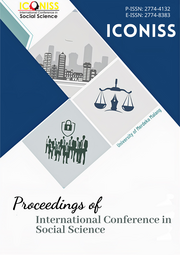The Application of Ultra Petita Principles in Resolving Employment Disputes to Achieve Justice
DOI:
https://doi.org/10.26905/iconiss.v3i1.9698Keywords:
Employment disputes, Ratio decidendi, Ultra petita principlesAbstract
Each branch of power can produce legal products. Legislative power produces laws and regulations, executive power produces policy regulations, and judicial power produces judges' decisions or verdicts that can become jurisprudence. The principle of court decisions is issued by the application and must not exceed what is requested. However, in certain cases, the judge can decide beyond what is requested, which is called ultra petita to achieve truth and justice. Weaknesses in the application of this ultra petita principle, sometimes cause problems that harm the applicant, so it needs to be studied and investigated. The focus of this study and research is limited to how judges consider deciding cases, especially employment disputes in Batu City, and how to apply the ultra petita principle in court decisions, especially the decisions of the Surabaya State Administrative High Court. The purpose of this study is to describe and analyse the basis for consideration of the Panel of Judges of the High Court in deciding cases of employment disputes and to review and analyse the application of the Ultra Petita Principle in Court Decisions. This study and research use a normative legal research method with a statute approach and a conceptual approach. The expected contribution of this study and research is theoretically for the development of legal science, especially in the field of development of constitutional law, and practice can provide input to legal practitioners, especially judges in decision-making, local government officials in Personnel Administration, as well as for further researchers. In providing references, especially regarding the Ratio Decidendi of Judges in Court Decisions to the Ultra Petita Principle.
Downloads
References
Abraham, A. H. F. (2007). Legal opinion teoritis & empirisme. Jakarta: PT Grafindo Persada.
Achmad, A. (2015). Menguak Tabir Hukum (Edisi Kedua). Jakarta: Prenadamedia Group.
Agustina, E. (2019). Sengketa kepegawaian dalam sistem peradilan tata usaha negara. Depok: Raja Grafindo Persada.
Ayu, P. (2013). Prinsip hakim aktif (Domini Litis Principle) dalam peradilan tata usaha negara. Masalah-Masalah Hukum, 42(3).
Bruggink. (1996). Refleksi tentang hukum: Pengertian dasar dalam teori-teori hukum (Trans: Arief Sidharta). Bandung: PT. Citra Aditya Bakti.
Carl, J. F. (2004). Filsafat hukum: Perspektif historis. Bandung: Nuansa dan Busamedis.
Friedmann, W. (1993). Teori dan filsafat hukum: Legal theory. (Trans: Mohamad Arifin). Jakarta: PT Raja Grafindo Persada.
Harahap, Y. (2008). Hukum acara pidana tentang gugatan, persidangan, penyitaan, pembuktian, dan putusan pengadilan. Jakarta: Sinar Grafika.
Herman, B. (2007). Filsafat hukum: Desain dan arsitektur kesejarahan. Bandung: Refika Aditama.
Hutchinson, T. (2002). Researching and Writing in Law. Sidney: Lawbook CO.
Jhon, R. (1973). Theory of justice. London: Oxford University.
Jhon, R. (1987). Basic liberties and their proirity. Cambridge: Cambridge University Press.
John, C. (1996). Western philosophy: An anthology. Oxford-UK: Blackwell.
John, R. (1980). Theory of Social Justice, H. Gene Blocker (ed). Ohio: Ohio University.
Karl, R. P. (2002). The open society and its enemy (Trans: Uzair Fauzan). Yogyakarta: Pustaka Pelajar.
Kusumaningrum, R. D. (2017). Putusan ultra petita dalam perkara pidana. Jurnal Putusan Ultra Petita dalam Perkara Pidana.
Marzuki, P. M. (2005). Penelitian hukum. Jakarta: Kencana Persada Media.
Mukti, F., & Yulianto, A. (2017). Dualisme penelitian hukum normatif dan empiris. Yogyakarta: Pustaka Pelajar.
Notohamidjojo, O. (1971). Masalah keadilan. Semarang: Tirta Amerta.
Notohamidjojo, O. (2011). Soal-soal pokok filsafat hukum. Salatiga: Griya Media.
Peraturan Perundang-Undangan Yurisprudensi Mahkamah Agung Republik Indonesia.
Putusan Nomor: 595 K/TUN/2018.
Putusan Nomor: 41 /B/2018/PT.TUN-SBY.
Ranuhandoko, I. P. M. (2000). Terminologi hukum (Cetakan Kedua). Jakarta: Sinar Grafika.
Ranuhandoko, I. P. M. (2003). Terminologi hukum Inggris-Indonesia. Jakarta: Sinar Grafika.
Sumaryono, E. (2002). Etika dan hukum: Relevansi teori hukum kodrat Thomas Aquinas. Yogyakarta: Kanisius.
Sunaryati, H. (1994). Penelitian hukum di Indonesia pada akhir abad ke -20. Bandung: Alumni.
Undang-Undang Nomor 5 Tahun 1986 tentang Peradilan Tata Usaha Negara, sebagaimana telah beberapa kali diubah, terakhir dengan Undang-Undang Nomor 51 Tahun 2009 tentang Perubahan Kedua atas Undang-Undang Nomor 5 Tahun 1986 Tentang Peradilan Tata Usaha Negara.
Undang-Undang Nomor 5 Tahun 2014 tentang Aparatur Sipil Negara.
Undang-Undang Nomor 30 Tahun 2014 tentang Administrasi Pemerintahan.
Downloads
Published
Issue
Section
License
Authors who publish in this journal agree to the following terms:
(1)Â Copyright of the published articles will be transferred to the journal as the publisher of the manuscripts. Therefore, the author confirms that the copyright has been managed by the journal.
(2) Publisher of Proceedings of International Conference in Social Science is the University of Merdeka Malang.
(3) The copyright follows Creative Commons Attribution–ShareAlike License (CC BY SA): This license allows to Share — copy and redistribute the material in any medium or format, Adapt — remix, transform, and build upon the material, for any purpose, even commercially.

